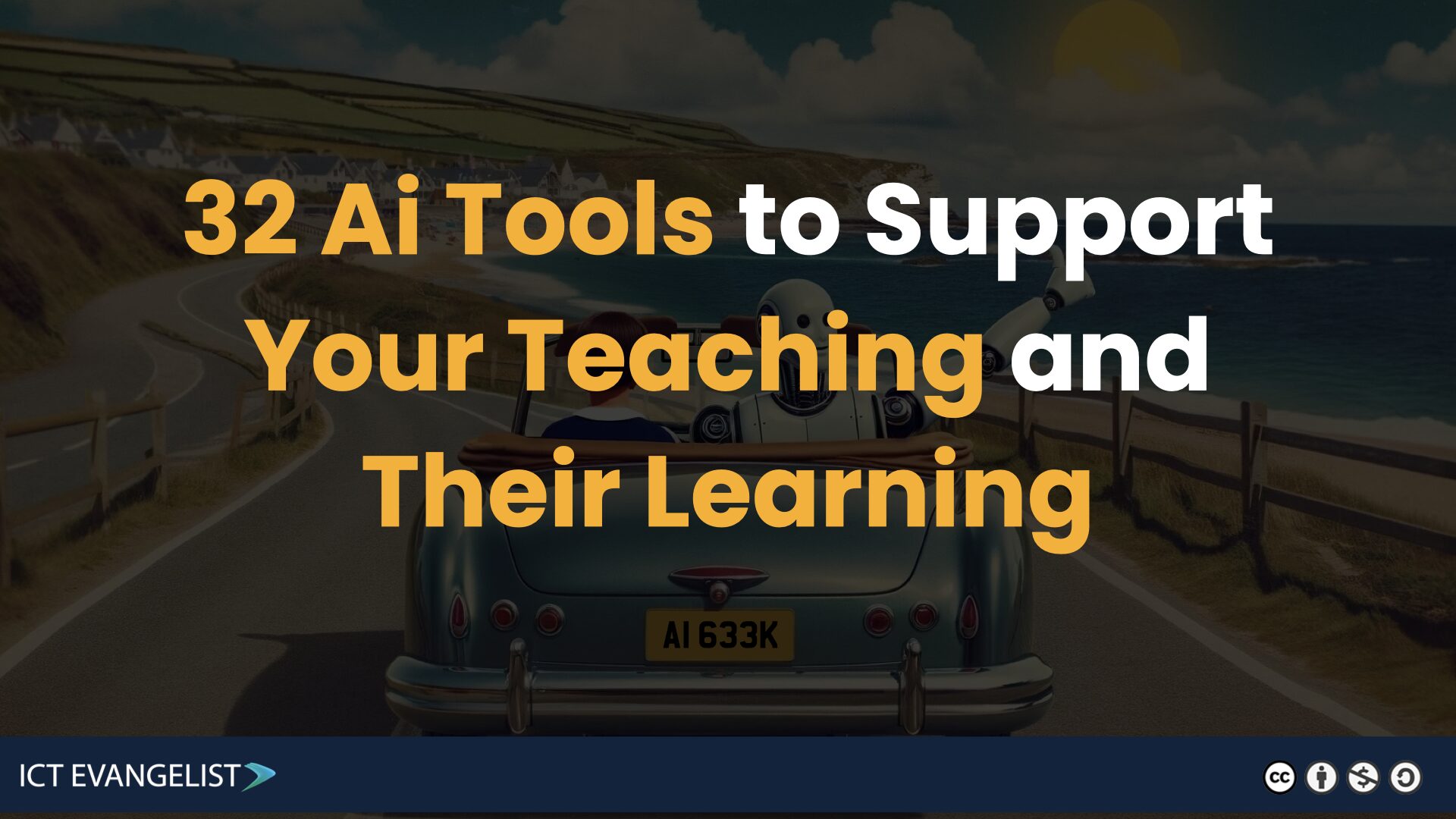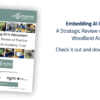
AI tools are becoming an essential part of modern education, offering helpful ways to reduce workload, enhance learning, streamline classroom tasks and support teaching and inclusion. To help share some of the most popular tools, I’ve created the infographic below with 32 Ai Tools to Support Your Teaching and Their Learning, available as both an image (which could be displayed on your digital signage) and as an interactive PDF with each of the tools hyperlinked so they can be clicked for access.
Grab the interactive copy of the infographic here
To help you know what each tools does, below is a list of the 32 tools with a short summary to explain its use to help you decide whether it would be helpful for you to explore. The tools are listed as per the infographic, working from left to right from the top row.
From AI tools that help with resource creation, to chatbots to support learning, to LMS systems with AI integration to help learning, teaching and workload reduction to image or even music generation tools, there’s lots to choose from.
Canva –
Canva offers a vast repository of templates and AI tools that make it easy for teachers to create engaging presentations, worksheets, and classroom resources. With AI-powered design assistance, educators can quickly generate professional visuals, whether for lesson plans or student projects. Canva’s free education plan gives teachers access to premium features, making it a powerful yet budget-friendly tool for enhancing classroom creativity and saving time on design tasks.
Mizou –
Mizou allows teachers to create personalised AI chatbots to support students with tailored feedback, tutoring, and grading. It’s a great tool for making learning more interactive and engaging, especially in K-12 classrooms. Teachers retain control over content and can monitor student progress through detailed reports.
MagicSchool AI –
A tool specifically for educators, MagicSchool AI generates lesson plans and activities, supporting the creative side of teaching while reducing preparation time.
Brisk Teaching –
Brisk is an AI-powered Chrome extension designed to save teachers time by integrating with tools like Google Docs, Slides, and YouTube. It automates tasks such as creating quizzes, slide decks, and differentiated lesson plans. Brisk also helps streamline administrative tasks like writing emails, newsletters, and recommendation letters, making it a valuable tool for managing day-to-day classroom needs efficiently.
Adobe Firefly –
Firefly integrates AI into Adobe’s creative apps, allowing educators to easily generate images and text effects. With tools like Generate Image and Text-to-Image, teachers can help students bring their ideas to life, making it perfect for classroom projects. Firefly enhances creative expression while remaining accessible for all skill levels, offering a range of features that help students visualise complex ideas and boost digital literacy.
Mindjoy –
Helps students and educators build and use machine learning models easily, making AI more accessible for practical applications in the classroom.
Conker –
Conker uses AI to create quizzes quickly and efficiently, offering a variety of question types that are standards-aligned. It integrates with tools like Google Forms and Canvas, allowing for seamless quiz distribution and grading. Conker also includes accessibility features such as a read-aloud function, ensuring inclusivity for all students.
Udio –
Udio is an AI-powered music generator that creates songs across various genres using descriptive prompts. It allows teachers and students to produce music to support learning, whether for storytelling, reinforcing concepts, or engaging with creative arts. With Udio, you can even add custom lyrics or remix and extend tracks, making it a flexible tool for creating memorable musical experiences tied to learning themes such as historical events or scientific concepts.
Microsoft Designer –
An AI-powered design tool to create professional documents and visuals, helping teachers and students focus on content rather than formatting.
Google Gemini –
Gemini is Google’s advanced AI model, excelling in tasks requiring real-time data analysis and multimodal processing, handling text, images, and even audio. It offers accurate, up-to-date information by pulling in live data from the web, making it a strong alternative to ChatGPT or Copilot, especially for educational content creation. Its seamless integration with Google’s suite of tools also makes it ideal for users already embedded in the Google ecosystem.
Microsoft Copilot –
The free version of Microsoft Copilot, available at copilot.microsoft.com, allows users to perform tasks like generating images, summarising text, and answering queries across various platforms, including the web and mobile. However, it does not integrate directly with desktop Microsoft apps such as Word, Excel, or PowerPoint, meaning that document and data work must be processed via manual uploads. During peak times, the free version may default to GPT-3.5.
The paid version, part of Microsoft 365, integrates seamlessly with Word, Excel, PowerPoint, and Outlook. It allows you to generate drafts, summarise content, analyse data, and create presentations directly within these apps, providing a much smoother workflow.
Ideogram –
Ideogram is an AI-driven image generation tool that allows users to create visuals by simply typing a descriptive prompt. It excels in producing aesthetically pleasing images, ideal for projects requiring clean, balanced visuals such as logos, posters, and marketing materials. One of its standout features is the ability to integrate text into images, making it especially useful for creating designs where text clarity and style matter. The tool is user-friendly, even for those with no design experience, making it accessible to both students and educators for creative projects. Below you’ll see a series of images created using Ideogram.ai which helps teach about idioms.

EduGPT –
EduGPT provides personalised AI support for both educators and students. It assists with generating lesson plans, quizzes, and study guides, all while adapting to individual learning needs. With features like customised learning paths, interactive learning modules, and robust tools for lesson planning, EduGPT is designed to enhance teaching and learning.
Opus Clip –
Opus Clip helps educators turn long video lectures or presentations into shorter, engaging clips for platforms like YouTube Shorts or TikTok. Its AI automatically selects key moments, adds captions, and formats the clips for social media, saving significant time on editing. This tool is perfect for repurposing lesson content into bite-sized learning materials for students.
Hello History –
Hello History allows students to engage in lifelike conversations with historical figures, offering a unique way to explore topics like art, philosophy, and science. By simulating discussions with figures like Einstein or Cleopatra, this tool makes history more interactive and fosters critical thinking. It’s a powerful supplement to traditional history lessons, encouraging students to explore different perspectives and develop a deeper understanding of historical events
SLT AI –
SLT AI provides school leaders with AI-powered tools to streamline time-consuming tasks such as drafting School Improvement Plans (SIP), staff appraisals, and newsletters. Designed specifically for school management, it pulls from UK-specific frameworks like Ofsted and DfE guidelines, ensuring that leaders get accurate and relevant content. By automating administrative duties, SLT AI allows school leaders to focus more on leadership and supporting staff and pupils.

Exam Solutions –
Exam Solutions specialises in maths and offers free, detailed video tutorials and step-by-step guides to help students master complex mathematical topics. With a focus on A-Level and GCSE content, it covers areas like calculus, algebra, and trigonometry. The platform’s AI-powered features provide instant feedback and personalised help, making it a valuable tool for both students and educators looking for additional resources to support mathematics learning
TeachMate AI –
A winner in the Global EdTech awards, TeachMate AI provides teachers with tools to automate time-consuming tasks like report writing, generating lesson plans, and creating student resources. It also offers support for SEND and adaptation, helping educators personalise learning without increasing workload. This tool is designed to streamline administrative duties and classroom tasks, allowing educators to focus more on teaching and student engagement.
Goblin Tools –
One of my favourite AI tool recommendations, Goblin Tools provides a set of AI-powered tools aimed at helping neurodivergent students manage tasks more effectively. It breaks down overwhelming tasks into smaller, manageable steps, making it ideal for students with ADHD or autism who might struggle with executive functioning. The platform also helps with time estimation and tone adjustment in communications, offering tools that can support both organisation and communication in an educational setting. This makes it a valuable resource for teachers looking to personalise learning support for students with additional needs.
Pi from Inflection AI –
Pi is a personal AI designed for intelligent and empathetic conversations, making it a useful tool for educators as a coach or reflective companion. It helps teachers process ideas, discuss complex topics, and get personalised feedback on creative or pedagogical projects. While Pi offers a supportive conversational experience, it’s not recommended for younger students due to its general nature, lack of age-specific safeguarding, and occasional inaccuracies, making it more suitable as a tool for adult educators.
Eduaide –
Eduaide helps teachers save time by generating high-quality lesson plans, activities, quizzes, and feedback, tailored to specific subject areas like Science, Maths, and Social Studies. Its AI-powered tools assist with personalised lesson planning, and its assessment and feedback bots are useful for automating grading. With the ability to work in over 15 languages, Eduaide also ensures accessibility for diverse classrooms, all while safeguarding student data.
Toddle –
Toddle is an AI-powered platform designed to streamline curriculum planning, assessments, and communication for teachers. It allows educators to collaboratively create curriculum maps, unit plans, and assessments, while also offering tools for personalised student feedback. The AI assistant helps teachers save time by generating lesson plans, one of my favourite features, progress report comments, and worksheets. It’s particularly valued in IB and progressive schools for fostering student engagement, reducing teacher workload, and improving collaboration across teaching teams.
Teachable Machine –
Teachable Machine allows educators to create custom machine learning models quickly without needing coding experience. Teachers can build models using images, sounds, or poses, which makes it an excellent tool for introducing students to AI and machine learning concepts. It’s particularly useful for hands-on projects, making abstract AI concepts more accessible and engaging for students.
Suno –
Similar to Udio above, Suno helps teachers create catchy tunes with custom lyrics to make learning more memorable. Whether it’s writing songs to explain mathematical concepts like mean, median, and mode or creating background music for study sessions, Suno enhances engagement. Its versatility across genres allows educators to connect key concepts to fun, memorable music, making it easier for students to retain information. You can find an example I made recently for Kings Monkton school below.
TLDR This –
TLDR This automatically condenses long articles or documents into brief, easy-to-read summaries, saving educators time when preparing lesson materials. The tool also strips away distractions like ads and pop-ups, ensuring a clean reading experience. Teachers can use TLDR This to summarise lengthy academic texts, helping students focus on core ideas without getting overwhelmed by information overload. It’s particularly handy for creating quick summaries of chapters or articles for classroom use.
Quizizz –
Quizizz AI simplifies quiz creation by generating questions from documents, websites, or text, and aligning them to learning standards. This saves time while ensuring assessments are both engaging and compliant with educational benchmarks. Teachers can customise quizzes for different difficulty levels and use the real-time feedback feature to gauge student understanding effectively.
Formative –
Formative’s AI tools help educators save time by generating standard-aligned questions and personalised hints for students. It provides real-time feedback, enabling teachers to track student progress and give immediate interventions. Additionally, the AI automates the creation of assessments from existing materials like PDFs, making it easier to convert documents into interactive quizzes and assignments. With its focus on auto-grading and personalised support, Formative helps teachers enhance classroom engagement and efficiency.
Music Labs –
Music Labs offers a variety of interactive experiments, such as Song Maker and Shared Piano, allowing educators and students to explore music creation in a fun, hands-on way. Teachers can integrate these tools into lessons, making abstract concepts like sound waves and rhythm more accessible. The platform supports projects across subjects like science and maths, allowing for cross-curricular learning through music composition
YouTube Summary with ChatGPT –
This Chrome extension helps educators save time by generating concise summaries of YouTube videos. It also provides full transcripts, which can be helpful for creating lesson resources or revising key points from videos without watching them in their entirety. Teachers can customise the length of summaries and integrate timestamps, making it easier to navigate educational content and quickly assess its relevance for classroom use.
Perplexity AI –
Perplexity AI excels at delivering concise, accurate responses with citations, making it a powerful research tool for educators. Unlike standard search engines, it provides well-referenced answers from multiple sources, ensuring reliability. While it offers conversational capabilities similar to ChatGPT, Perplexity’s strength lies in its ability to pull from real-time data and display references clearly, helping teachers validate information and streamline lesson preparation. This makes it an ideal halfway house between the generality of Google searches and the creative, but sometimes less sourced, output of LLMs like ChatGPT.
Claude AI –
Claude AI offers a wide range of advanced tools to support educators. Its Artifacts feature allows users to create and manage standalone content like code snippets, documents, and diagrams, making it easy to organise and share resources for lessons. The new Computer Use feature lets Claude perform basic tasks like typing and navigating digital interfaces, streamlining digital tasks for busy teachers. These tools, along with Claude’s conversational capabilities, make it an effective assistant for content creation and classroom management.
ChatGPT –
ChatGPT, powered by OpenAI, assists educators in generating ideas, lesson plans, and quizzes. It can provide tailored feedback, write reports, and summarise complex topics, making it an efficient tool for reducing workload. With its conversational nature, ChatGPT can help teachers brainstorm creative approaches, engage in reflective dialogue, and even craft student resources. However, educators should guide its use in classrooms, as its responses, while helpful, may require verification for accuracy.
Worthy of note…
It is important to note that with all of these tools, should you consider their use within your school, before you use them in an educational setting, each tool should go through a data protection impact assessment process before use by checking with your IT team to see if it’s ok to use the tool. You should also consider anonymising and identifiable information before putting it into systems, unless you’ve been told otherwise that this is ok, such as from your school or Trust’s IT team.
Want more?
If you haven’t noticed beyond the Halloween offers in your supermarket, Christmas is coming and with that this year I will be working with my partner in Global EdTech, Ronan McNichol to create another Appvent calendar, focusing again this year on 24 Days of AI. If you’re an EdTech company reading this and would like to get involved, please check out our page to find out how you can get involved.
Transparency
None of the tools shared on this page have any kind of affiliate scheme associated with them, no sponsorship has been secured for mention of any of them. Yes, I have put a reference link on each URL on the resource so that, if it is clicked, the companies listed can learn better where the click has come from, given its held within a PDF.















